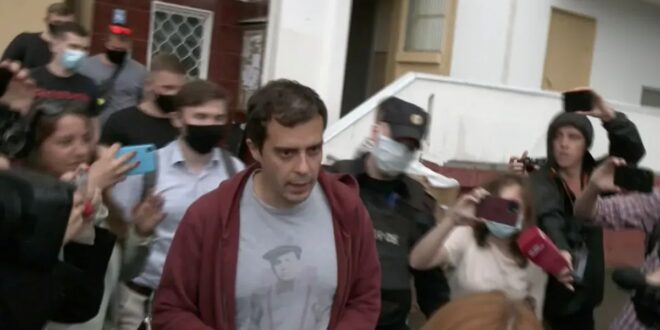President Vladimir Putin and the Kremlin are each day moving closer to the era of the Soviet Union’s complete control of the information that the Russian people can see, hear, and read.
Under the new “Foreign Agent” designation, the Kremlin can now crackdown on all independent news services and reports which are in direct contrast to the government-run, funded, and controlled outlets such as Sputnik and RT (Russia Today).
On Tuesday, the Federal Security Service (FSB), Russia’s main security agency, released a 60-point list of information that “states, organizations and foreign citizens can use against the security of Russia.”
Covering any crimes related to the military, troop deployments, training, and structure of the Russian armed forces and other security organizations are grounds for a media outlet to qualify as a “foreign agent.”
The Kremlin initially adopted the “foreign agent” law in retaliation to the RT and Sputnik news organizations being forced to register as such in the United States. In Russia, that designation has now been expanded to virtually all news organizations that are not controlled by the Kremlin.
On August 20, the country’s largest independent online broadcaster, TV Rain (Dozhd), was branded a foreign agent. The same day, the investigative website Vazhnye Istorii (IStories), its editor-in-chief, and five of the site’s journalists were also listed as foreign agents.
When several journalists picketed FSB headquarters holding signs that read “Journalism is not a Crime” and “You are Afraid of the Truth,” they were detained by the FSB.
Entities under the foreign agent designation must submit quarterly financial reports, and are obliged to include boilerplate text stating their designation on everything they publish, including social media posts.
The Kremlin’s registry of foreign agent media has forced a number of labeled outlets to shut down after the designation led to advertisers running for the hills.
Roman Dobrokhotov, editor-in-chief of The Insider, who angered the Kremlin with its investigation into the poisoning of opposition politician Alexei Navalny, said the FSB has branded him a wanted man and forced him to flee to Ukraine.
A Tangle of Corruption
The person behind this latest crackdown on independent journalism in Russia seems to be Aleksandr Ionov, the self-styled human rights defender who has ties to the Russian government and the FSB.
Ionov founded the Anti-Globalization Movement of Russia (ADR). The organization lists among its honorary members Syrian President Bashar Al-Assad, Venezuelan President Nicolas Maduro, and former Iranian president Mahmoud Ahmadinejad, none of whom are known for being human rights defenders.
During the protests and riots inside the United States following the death of George Floyd, CNN reported on “troll farms” operating from Ghana. These troll farms focused almost exclusively on racial issues in the U.S., according to the reporters, promoting black empowerment and displaying anger towards white Americans. The troll farms were traced to Ionov’s ADR.
Although he calls himself a defender of human rights, Ionov has written to the Russian censorship agency, Roskomnadzor, about a story that the independent media outlet Medusa published.
Further, ADR received a grant of one million rubles from the National Charitable Foundation, which was started by President Putin and supports military and patriotic projects under the patronage of the Kremlin.
Ionov also helped Alexander Malkevich, a U.S.-sanctioned political strategist, crowdfund efforts to support Maria Butina who was in prison in the U.S., at the time, after being convicted of conspiring to act as an agent of a foreign government.
Malkevich is linked to oligarch Evgeny Prigozhin, “Putin’s chef” the owner of the Russian Wagner Group. Malkevich allegedly told British journalist Sterling Jones in an email that he was circumventing U.S. sanctions by donating money to pay Butina’s legal bills through Ionov’s ADR.
The Russian “foreign agent” law requires independent media to disclose sources of funding and put a disclaimer in capital letters, above every post that they publish, warning viewers they are about to read content from a foreign agent. If the print and television media outlets fail to do so, they face fines, criminal charges, and even a complete publication ban.
 Eurasia Press & News
Eurasia Press & News




